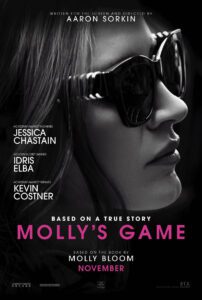
Director: Aaron Sorkin
Release Year: 2017
Runtime: 2h 20min
I can’t really speak to Aaron Sorkin as a director, but there are few others who can turn a phrase or inject a scene with more energy than him. You know a Sorkin script the minute you hear it. And I know some people hate the walk-and-talk and the sometimes glib way he can use language, but I can do nothing but appreciate the absolute mastery he has over dialogue. The thing is, it takes a particular performer to deliver the dense and intricate sentences in a convincing way. See Jesse Eisenberg in The Social Network. And now Jessica Chastain in Molly’s Game. His words suffuse the characters with an intelligence that is preternatural, but other-worldly. Like they have the perfect turn of phrase always at hand. So it takes the right actor to do this without seeming like they’re “acting.” And Chastain does a masterful job of imbuing this real-life woman, Molly Bloom, with a humanity that feels real. Even though we know in our heads there’s absolutely no way any human ever could be this witty and “on” all the time.
As I’ve stated a thousand times, I’m not generally a fan of biopics. But while this is certainly Molly Bloom’s story, the larger theme here is about an industrious woman making it in a male dominated world. And, like the aforementioned Social Network, Sorkin manages to take the core story and amp it up to a level where, even at almost two-and-a-half hours, it never drags or feels like we’re trying too hard to make a hero out of the subject. And, of course, taking liberties where necessary and probably leaving out details that might be a bummer. This time he doesn’t have David Fincher to lean on, though, taking on the directing duties himself. And while everything is better with Fincher, Sorkin holds his own directorially. It helps that he employs a cadre of actors in supporting roles who are clearly psyched to be in a Sorkin movie. Psyched to speak his words out loud. It’s like an army of fast-talking twitch. Michael Cera, Chris O’Dowd, Jeremy Strong and an underrated Joe Keery. Cera, especially, playing against type is just miraculous.
Bloom’s story is kind of tailor made for this kind of tale. A former Olympic-level athlete with a withholding stage dad combined with Hollywood intrigue, poker, drugs, prostitution, the mob (both Russian and Italian), ponzi schemes, court drama… All wrapped in the meta narrative of Bloom’s book she wrote about all of this being the basis of the movie, but also included as part of the story itself. In other words, this was a giant playground for Sorkin to play in. There’s a lot here, so the runtime is not surprising. The film’s perspective is obviously heavily skewed toward Molly Bloom. Sorkin doesn’t really ever pretend to be an impartial observer. It’s not as if he papers over the warts, but there is never any doubt who the hero of this story is. I think this is all due to the fact that Bloom is portrayed as an open book. Her desire for her father’s (Kevin Costner) approval. Her addiction. Her fateful decision to take from the poker pot, thus moving her private, celeb-laden card games from legal to illegal. Despite some of her failings, she is portrayed as incredibly forthright, and a person of high integrity. In other words, we are meant to like her. But it’s not done through emotional manipulation or maudlin nonsense. This is basically a combination of Sorkin’s up-front script and Chastain’s performance.
We really get to see this boldness and, uh, pluck when we are introduced to Molly’s lawyer, Charlie Jaffey (Idris Elba). Bloom is at her lowest, hanging on by a thread, but we are introduced to this man who is both her friend and her foil. A man who is won over by her intelligence and charm and her story. But also questions and challenges her at every turn. Because he too is a moral cog in an otherwise moral-free town. Enter the Sorkin banter machine. The unending tennis match of back-and-forth zingers. The reason you come to a Sorkin show. And the shit is good. So good. There is some active viewing necessary to follow some of the puzzle-piece narrative, which employs flashbacks and time compression and tons of fast-talk exposition. So, lots of telling, not showing. Which would usually be an issue, but Sorkin makes it work. You just have to pay attention, because the stuff moves fast. Ultimately, Sorkin and his crew have to take a very dense story, boil it down and stuff it full of words. He’s a master at that. And his actors really deliver on that vision. It’s an impressive feat that is not only a technical triumph, but an entertaining one as well.


